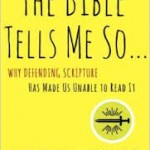 Today’s post is an interview with Dr. Chuck DeGroat about his latest book Toughest People to Love: How to Understand, Lead, and Love the Difficult People in Your Life (Including Yourself)
Today’s post is an interview with Dr. Chuck DeGroat about his latest book Toughest People to Love: How to Understand, Lead, and Love the Difficult People in Your Life (Including Yourself). Chuck, who has blogged here before (here and here), is the author of Leaving Egypt: Finding God in the Wilderness Places, and c
o-founder and senior fellow at the Newbigin House of Studies, a partnership between City Church San Francisco (where he has served as a teaching pastor) and Western Theological Seminary (where he is Associate Professor of Pastoral Care and Counseling). He has also served as a professor and Director of Spiritual Formation at Reformed Theological Seminary (Orlando).
Let’s get one thing off the table, shall we…did my family and/or friends beg you to write this book?
Though I receive lots of letters and late night phone calls from your family and friends asking for help in their dark night of knowing you, this book is not about Pete Enns! Truthfully, I asked the Twittersphere what I should write, and received dozens of messages back asking for a book on this very topic.
Pastors, in particular, asked for an accessible guide to understanding the complicated human soul, with clear application for some of messiest people we encounter. But I’ve written the book to be accessible to anyone who leads or loves or simply hopes to better understand the complicated, difficult people in their lives.
Can you describe your basic approach to understanding people?
I see the first pages of Scripture telling our story–a story of people both beautiful and broken, a story of deep longing and intimate love twisted into distorted forms, manifesting in shame and hiddenness. It’s a story we live each day. We are people capable of extraordinary compassion, on the one hand, and sinister manipulation on the other. Sometimes, I think we’re surprised by how complex we are.
What I explain in the book is that early on in our lives we recognize the need to cope with the broken world we’ve been birthed into. Our earliest relationships are key to this, but our parents and caregivers aren’t perfect, right? We cope as best we can, but the relational strategies we develop early on become constitutive of our adult patterns of relating.
What Christians call “sin” and what psychologists call “psychopathology” put words to the disordered and dysfunctional ways of relating.
Sin is usually understood as “bad behavior.” What do you mean by “style of relating?”
Early Christian theologians saw sin in a more complex way than we do. If you define simply as bad behavior, it makes the solution seem simple–just behave better! Early Christians used the word “passion” to describe sin, and the “passions” were understood relationally.
You see, these early theologians believed that you and I were created in and for desire–good and beautiful desire for God, for love, for beauty, for union.
Sin was understood as twisted desire. Instead of desiring God, we desire a God-substitute. We look for satisfaction in false gods. We become intimate with these imitation gods. And they betray us, causing us to suffer (thus, the Latin word “passions”). The 7 deadly passions can be understood as relational sufferings–ways in which we sabotage the life for which we’ve been made for something less.
And psychology took its cue from this early Christian framework?
I do think that the categories we use as psychologists can be understood through this lens. And this is what I attempt to do. I’m quite comfortable with the contemporary psychological insights accumulated over the last century or so, but I’m also mindful that Christians live under a different Story, and that our Story helps makes sense of the data we’re gathering.
For instance, we’re all familiar with the term “narcissism.” One psychologist says that “the narcissist’s personality is based on a defensive false self that he must keep inflated, like a balloon, in order not to feel the underlying rage and depression associated with an inadequate, fragmented sense of self.”
That defensive false self is what I see as distorted desire, a faulty and dysfunctional way of relating to God and others, which ultimately undermines a person’s happiness. Perhaps, it manifests in the deadly passion of “pride,” a way of being and relating which may look confident on the outside, but which reveals deep insecurity, fear, and shame at the core.
Your model of understanding people engenders compassion. Why should we be compassionate when these people hurt us?
I get that. I’ve received the Monday morning emails with scathing reviews of my sermon. I’ve been confronted, accused, gossiped about, undermined, plotted against, and more. If you want to avoid these things, avoid any leadership. I’ve also been pastoring and counseling and leading long enough to know that every person has a story.
Brokenness and sin don’t happen in a vacuum. As I said, people learn very early on how to cope, and these ways of surviving and coping and self-protecting take on forms that hurt us. In time, I think we learn to show compassion to the broken and wounded soul behind the manipulative and hurtful external strategies.
Within every bully is a frightened little boy. And with that realization, I can show compassion while at the same time challenging and confronting the relational style. In the book, I talk about how this plays out with addicts, with narcissists, with obsessive compulsives and histrionics–the kinds of people leaders most struggle with.
In the last section, you turn your attention to the pastor/leader. Why did you include this portion in a book devoted to leading and loving others?
I’m convinced that we’ve got to put the oxygen masks on ourselves before we help others. To the extent that we identify our own inner darkness, we’ll be able to care for others. I’m convinced that Fr. Richard Rohr is right, that we’ve got to become adept at shadow-boxing, looking at the dark shadows we cast before pointing to the darkness of others.
Jesus said it well–“Remove the log in your own eye.” But how? I walk through this process in some detail, adding some of my own story and struggle to the mix.
How is this book different from other self-help books out there?
Because it’s not a self-help book.
There is no recipe for helping an ailing soul, not 3 steps or 7 principles. We are “fearfully and wonderfully made,” which means that we’re not puzzles to be solved but mysteries to be approached.
This book isn’t a “how-to” book, but I do hope it is a “wisdom” book. To the extent that we risk entering into the lives of difficult people, let alone our own, we’ll find ourselves more and more reliant on the deep Wisdom of a God who became one of us in order to love and redeem us. And that’s where all good “helping” begins.
















